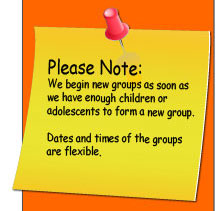| July 2008 - Volume 35 | |
| Helping Children and Adolescents Succeed Socially! | |
| The Social Skills Groups | What is Social Anxiety? |
|
Social anxiety can be described as, fear of social situations that involve interaction with other people. It includes the fear and anxiety of being judged and evaluatedby other kids/ young people. If a person usually becomes anxious in social situations, but seems fine when they are alone, then "social anxiety" may be the problem. Socially anxious people have thoughts and fears that are irrational. The person does not realize that their thoughts and feelings are not necessarily true and they get them upset and angry. Their negative automatic thoughts and feelings that occur around social situations make them feel bad. Social anxiety is the third largest psychological problem in the world today. It can be treated, and a person can learn to overcome anxiety and make and keep friends. They can learn to overcome their thoughts and worries and experience JOY in their lives and with their peers. What kind of thoughts are you thinking (is your child thinking) each and every day?
How do we feel when we think hot thoughts? Answer: Bad.
How do we feel when we think cool thoughts? Answer: Good. For practice, give examples of hot thoughts you or your child may have and change them into cool thoughts. Example: Hot Thought: I was not invited to a certain person's house because they do not like me. Cool Thought: I will call another friend and make different plans. Moral to the lesson, focus on what you want and not on what upsets you and what you do not want in your life. Remember that you are a creative individual and that what you think about you bring about. If you want something to come to pass in your life, first you must think of it. Think of it intentionally, and keep your focus on it. Do not keep your focus on what you do not want, because in the same way... you will get that too. The more emotion (feelings) you have in the thought, the quicker it will come to you. So do not put your emotion in a bad thought for that will also come to you, even if you do not want it. You have a right to live a happy and contented life. This begins with intentionally choosing cool thoughts. Other tasks and skills to assist a person with Social Anxiety:
-- Susan Stern, LCSW is the founder of The Social Skills Place, Inc. |
| The Social Skills Place, Inc. :: 310 S. Happ Rd, Suite 201 :: Northfield, Illinois 60093 Office 847 446-7430 :: Cell 847 507-8834 :: www.socialskillsplace.com |
|
| (C) 2006-2021 :: All Rights Reserved :: Unsubscribe from our mailings |
